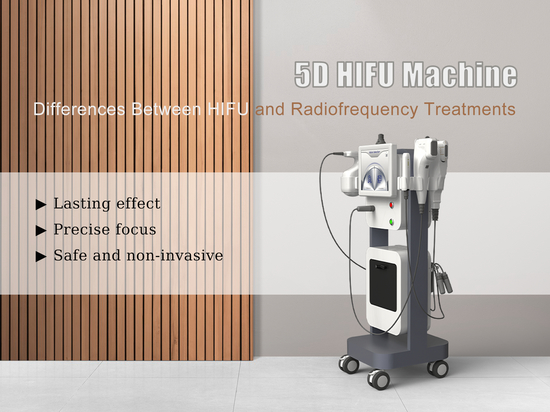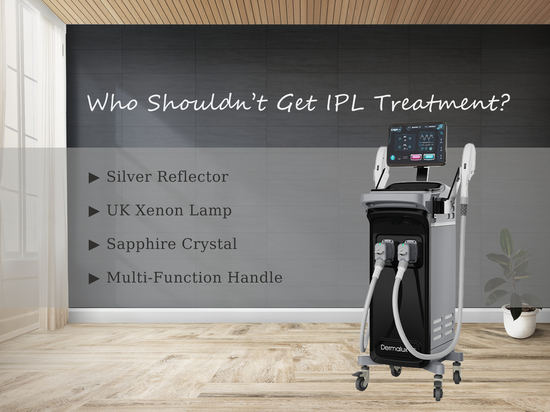
#Industry News
How to treat sensitive muscles with photons?
What is sensitive muscle?
Sensitive skin is a type of problematic skin, but not belong to the category of skin diseases, but a long-term unhealthy state of the skin. It is mainly due to damage to the facial skin barrier, weakening of the protective layer of the skin and susceptibility to external stimuli such as season, environment, cosmetics, alcohol, etc., resulting in "dry and tight face, red blood streaks, frequent redness, and occasional rash".
It should be noted that sensitive skin does not equate to skin allergies. Skin allergy is mainly a type of facial dermatitis, which is an inflammatory response caused by type IV hypersensitivity reactions, mostly caused by exposure to allergens.
But sensitive skin is more prone to allergies because the skin barrier of sensitive skin itself is very fragile.Once the skin's protective ability decreases, it can easily lead to inflammatory reactions.
Sensitive skin type
1. Dry and sensitive skin:
Regardless of the season, the skin is always dry and rough? And once you apply toner, you will feel a slight stinging pain, itching, and sometimes redness and swelling. Women with these symptoms belong to dry and sensitive skin. If the skin is too dry, it can lead to a decrease in its own resistance, resulting in skin sensitivity!
2. Oily sensitive skin:
prone to acne and small particles on the face, which can cause redness, swelling and inflammation. Even dry areas such as the cheeks can develop acne. Experts say that people with these symptoms should belong to oily sensitive skin. The reason for sensitivity is that excessive attachment of excess sebum and insufficient replenishment of moisture can cause a decrease in the skin's own resistance, leading to skin sensitivity!
3. Pressure sensitive skin:
Have you ever thought that women's sensitive skin is due to seasonal changes or pre physiological periods? The use of makeup and skincare products can become uncomfortable. As long as there is insufficient sleep or high stress, the skin will become dry. People with these symptoms should belong to pressure-sensitive sensitive skin. The reason lies in endocrine disorders caused by various external stimuli or hormonal imbalances. Then relax and enjoy every surprise around you~
4. Permanent sensitive skin:
similar to allergic dermatitis or abnormally sensitive sources such as sunlight, fragrances, pigments, etc. Specific irritants (allergens) can cause allergic reactions it can be dangerous to continue following one's daily care routine. It is best to seek medical attention immediately at a dermatologist's clinic and use the skincare products recommended by a physician.
How to determine sensitive muscles?
Sensitive skin is a highly sensitive skin condition that refers to a multifactorial syndrome in which the skin is susceptible to subjective symptoms such as stinging, burning, tightness, itching, redness and dryness caused by factors such as temperature changes, climate changes, emotional changes and external contact. For example:
A. During seasonal changes, the skin is prone to dryness and stinging.
B. When using acidic skincare products, there is a stinging sensation on the skin that persists for a long time.
C. Emotional tension or skin turning red when entering a warm air conditioning room, and even feeling the flow of blood vessels in the skin.
D. Not applying sunscreen when going out can quickly cause discomfort to the skin.
What is the cause of sensitive muscles?
1. External stimuli:
Improper skin care (such as excessive cleaning, use of inferior cosmetics), excessive phototherapy, emotional stress, cold and hot stimulation, sun exposure, etc. can all lead to damage to the skin barrier function, resulting in the appearance of sensitive skin.
2. Inflammatory skin diseases:
Improper skin care (such as excessive cleaning, use of inferior cosmetics), excessive phototherapy, emotional stress, cold and hot stimulation, sun exposure, etc., can all lead to damage to the skin barrier function, resulting in the appearance of sensitive skin.
3. Family genetic factors:
Skin and its sensitivity caused by familial inheritance.
Severity of sensitive muscles
1. Mild sensitive skin:
The cuticle is weak, powder blusher appears on both sides of the cheeks. There is no obvious itching, pain, swelling, heat, redness and other symptoms, but it will appear dry and red as the season changes.
2. Moderately sensitive skin:
The stratum corneum is weak, and there is a phenomenon of redness on the face. Red blood streaks are sometimes absent, and there is a feeling of fever without obvious itching, pain, or swelling symptoms.
3. Severely sensitive skin:
The stratum corneum is very weak, with visible red blood streaks and obvious symptoms such as itching, pain, swelling, heat, and redness. Some skin even shows inflammation such as water seepage and herpes. (It is recommended to seek medical attention at a hospital and not rely solely on skincare products for repair)
How to treat sensitive muscles with photons?
In general, as long as patients with sensitive skin are not in the inflammatory or red swelling stage, they can use the light modulation effect of photon rejuvenation to contract and dilate capillaries and then establish a relatively stable skin barrier, achieving a good therapeutic effect.
However, in clinical practice, many doctors are very easy to directly treat patients with sensitive skin with telangiectasia. As sensitive skin patients have defects in the epidermal barrier structure, direct vascular closure treatment can actually worsen sensitive skin. Therefore, in clinical practice, we need to do a good job in repairing the skin barrier and suppressing inflammatory reactions.
At this time, a 560nm filter with superphotons can also be used to treat sensitive skin with low energy at this wavelength, with the patient's painlessness as the endpoint response. It has a good therapeutic effect on sensitive skin. At the same time, during the treatment process, if the patient's sensitive symptoms are significantly relieved and there are basically no redness, papules, persistent flushing or other manifestations, only capillary dilation remains, then a filter targeting red blood vessels can be chosen to control the later vascular problems. This can provide good help from the initial sensitive skin to the remaining vascular problems.
Will photons make the skin thinner and more sensitive?
Not. Many people believe that photon rejuvenation can damage the fragile stratum corneum, just like peeling off a wall, becoming thinner and thinner over time. In fact, photon rejuvenation can activate fibroblasts in the skin, increasing the synthesis of collagen fibers and elastin fibers. After the rearrangement of these newly formed collagen and elastin proteins, the skin will become more elastic, shiny and firm, wrinkles will be reduced. So reasonable and moderate phototherapy not only does not make the skin more sensitive, but can also strengthen the skin barrier.
Other physical therapies for sensitive muscles
At the same time, in clinical practice, the choice of treatment method needs to be based on the patient's skin condition, combined with multiple methods such as drug therapy and phototherapy, in order to achieve better cure. Treatment methods also vary at different stages.
The treatment options for sensitive muscles during acute attacks include:
1. Cold spray and compress
Skin inflammation can cause superficial blood vessels in the facial dermis to dilate, leading to increased blood flow and discomfort such as redness, burning, swelling, etc. Proper use of cold spray and compress can remove heat, shrink capillaries, and quickly control and relieve discomfort in acute facial dermatitis.
2. LED phototherapy
Red light: with a wavelength of 630nm ± 5nm, it utilizes its high purity, strong light source and uniform energy density to regulate the photobiological activity of mitochondria. It can effectively act on dermal tissue, accelerate blood circulation, promote skin metabolism, stimulate collagen growth, thereby increasing skin elasticity and repairing sensitive skin.
Yellow light: with a wavelength of 590nm ± 5nm, it has a good relieving and therapeutic effect on sensitive skin and skin in the allergic period. It can promote the restoration of the skin's brick wall structure and accelerate the repair of the skin barrier function.
3. Short wave therapy (desensitization instrument)
Non thermogenic micro radiofrequency has the function of moisturizing and assisting in repairing the skin barrier.
Vortex electric field technology: Heating the skin causes collagen to contract, accelerates fibroblast regeneration, and restores skin elasticity.
Super ionization technology: ionizes ordinary water into charged ionized water, making it easier for the skin to absorb water. At the same time, the potential distribution on the surface of the cell membrane is changed, and water channels are opened to replenish water to the deep layers of the skin.
Oxygen injection technology: Inject pure oxygen into the skin at a pressure of 2-3pa to improve skin hypoxia, accelerate cell metabolism, and restore skin health.
The above three functions help rebuild the skin barrier, thereby repairing sensitive skin.
Sensitive muscles in the stable phase can be treated with the following methods:
DPL precision phototherapy
The wavelength emitted by ordinary photon sources is between 200-1200nm, while DPL precise light passes through specially designed dye crystals, and the spectrum is compressed to 500-600nm, allowing the light to selectively act on oxygenated hemoglobin. The endothelial cells of blood vessels undergo photo coagulation, causing blood vessels to close and dilated capillaries to disappear, achieving the effect of removing redness.
How should sensitive muscles be cared for?
The twelve word motto for protecting fragile skin: Protect first, avoid irritation, and strengthen repair. Try to avoid prolonged exposure to sunlight, consume less spicy and stimulating food, quit smoking and drinking, avoid using hot or cold water to clean the skin and avoid excessive scratching; skin care should be simple, do not wash your face excessively, and do not use effective skin care products or facial mask during the sensitive period; Standardize skin care, repair skin barrier function and restore skin tolerance.
Summary
At the same time, it is also recommended that patients take good daily care, reduce skin friction, avoid excessive cleaning and choose mild and non irritating products with simplified formulas for facial cleansers and skincare products.
Strengthen hydration and increase skin water saturation. It is recommended to apply moisturizing products as soon as possible after washing your face when the skin is still slightly wet. When going out, it is important to strictly protect oneself from the sun, avoiding the use of chemical sunscreens as much as possible and using physical sunscreens (such as umbrellas, hats, etc.) for coverage; Paying attention to the diet, etc.





